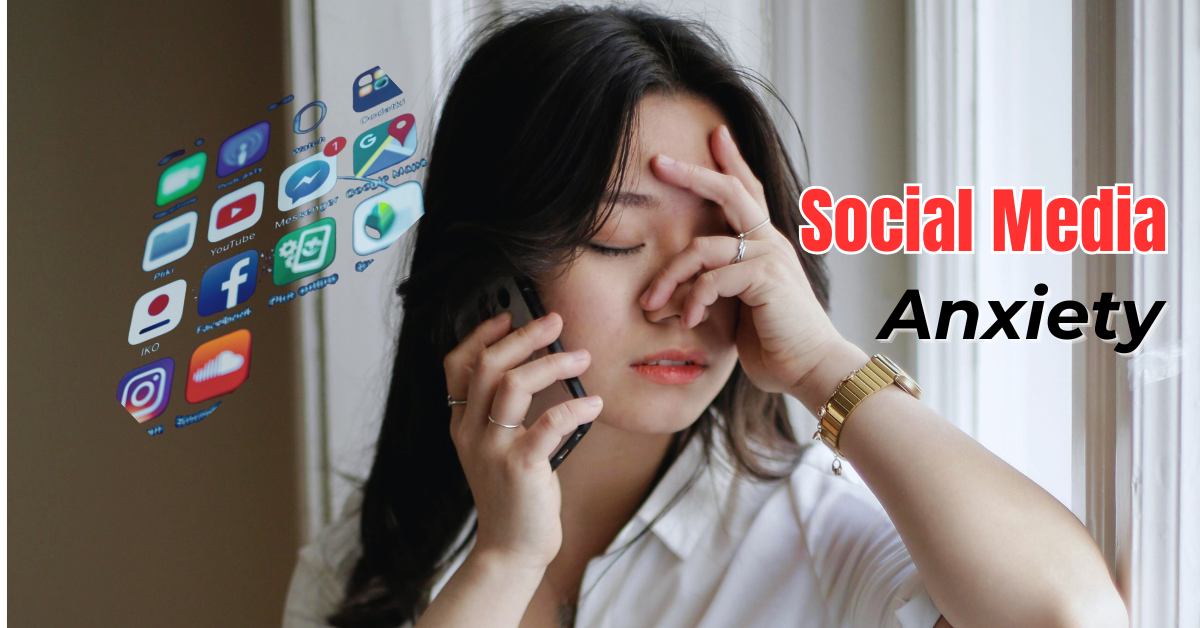Social Media Anxiety: 7 Ways to Protect Your Mental Health

Ever felt anxious after scrolling through Instagram or TikTok, even though you were just “relaxing”? You’re not imagining it. That discomfort isn’t just in your head—it’s a growing mental health issue known as social media anxiety.
In today’s hyperconnected world, we’re constantly absorbing filtered realities, comparison culture, and digital noise. Over time, it starts affecting how we see ourselves and others. So how do we protect our minds in a world that never stops posting?
Let’s explore what social media anxiety really is, how it shows up in daily life, and seven smart, realistic ways to protect your mental health—without giving up technology completely.
What Is Social Media Anxiety?
Social media anxiety refers to the emotional stress or mental discomfort that arises from using social media platforms like Instagram, Facebook, TikTok, or X. Unlike general anxiety, which may stem from multiple sources, this one is closely tied to our digital behavior and online interactions.
Many people experiencing this form of anxiety feel:
- Overwhelmed by constant notifications
- Pressured to post, respond, or keep up
- Left out when not included in online trends
- Insecure after comparing themselves to others
- Stressed when a post doesn’t get enough likes or views
Even when we know it’s curated content, our brain often takes it personally. Why? Because social media taps into our basic human needs—validation, connection, and belonging. But when those needs are constantly challenged online, it creates emotional friction.
How Does Social Media Affect Mental Health?
Although social media has its benefits—staying in touch, building community, or accessing information—it also affects your emotional well-being in ways that sneak up on you.
Here’s how:
- Comparison traps: Constantly seeing “perfect” bodies, lives, or vacations can trigger self-doubt.
- Fear of missing out (FOMO): Seeing others socialize while you’re at home can heighten loneliness.
- Online validation: Relying on likes and comments for self-worth can create emotional instability.
- Information overload: Too much content (especially negative or shocking news) leads to stress and fatigue.
- Sleep disruption: Scrolling late into the night affects melatonin levels and increases anxiety.
“We compare our behind-the-scenes with everyone else’s highlight reel—and it’s exhausting.”
The good news? You don’t have to quit social media cold turkey. Instead, let’s look at how to use it more mindfully.
7 Ways to Protect Your Mental Health
1. Set Clear Boundaries to Protect Your Mental Health
The first step is setting healthy limits. Try designating specific times during the day for social media instead of using it constantly. Turn off non-essential notifications. Better yet, keep your phone out of reach during meals, bedtime, or work hours.
Create screen-free zones in your home—like the dining table or bedroom—to reduce emotional overload. When you define when, why, and how you use social platforms, you regain control over your digital experience—and that control lowers stress.
2. Identify Your Emotional Triggers Online
Ask yourself: What types of content make me feel drained, insecure, or irritated?
Maybe it’s fitness influencers or friends showing off perfect relationships. Once you identify emotional triggers, unfollow or mute accounts that consistently affect your peace of mind. You don’t owe your attention to anyone online.
Additionally, you can follow pages that promote healing, art, or humor. Cultivating a calming online environment is one of the most underrated self-care strategies.
3. Practice Mindful and Purposeful Scrolling
Instead of automatically opening Instagram or YouTube out of habit, pause and ask: What am I really looking for?
Are you bored, lonely, avoiding something? Setting an intention before scrolling—like learning, checking in with friends, or getting inspired—helps avoid emotional spirals. You might even start to schedule your screen time like you do with meals or sleep.
4. Take Regular Digital Detox Breaks
You don’t need to disappear from the internet forever. Even small detoxes can do wonders for your mind.
Try taking a break every Sunday, or start with 2 hours of offline time daily. During this period, avoid all digital communication and engage in slow, calming activities—like cooking, walking in nature, journaling, or doing absolutely nothing.
These breaks calm your nervous system, lower cortisol levels, and restore mental clarity. Over time, your body will start craving this stillness—and your mind will thank you.
“Disconnect to reconnect—with yourself.”
5. Replace Online Validation with Inner Confidence
We all crave recognition. But when your self-worth becomes dependent on how others react online, you’re in dangerous territory.
Instead of checking for likes, check in with yourself. What did you do well today? What are you proud of? This simple shift strengthens your self-trust.
You could even try writing private journals of your wins, maintaining a gratitude list, or saying affirmations aloud. These actions ground your identity internally instead of outsourcing it to strangers on the internet.
6. Use Tech Wisely to Reduce Tech-Related Stress
Technology isn’t the enemy—it’s how we use it.
Try these tools:
- Forest: Keeps you off your phone while growing a virtual tree
- Freedom: Blocks distracting websites
- Headspace or Calm: Offers short, calming sessions for anxiety
- Digital Wellbeing or Screen Time: Tracks how long you’ve been online and suggests breaks
Use these apps to train your mind to embrace focus, presence, and mental stillness.
7. Don’t Isolate—Reach Out When You Feel Low
When you’re drowning in social burnout, the instinct is often to isolate. But silence increases stress. Don’t hesitate to speak up.
Call a friend, text someone you trust, or schedule a therapy session. Human connection—real, raw, and offline—brings emotional balance. Even sharing your digital fatigue with someone can release the tension you’ve been carrying.
You don’t have to do this alone. The support you seek is closer than you think
Final Thoughts: Your Peace > Your Feed
Social media isn’t going anywhere. But your mental peace should never be the price you pay for staying “in the loop.”
By setting boundaries, understanding your emotional triggers, and curating a healthier digital environment, you can enjoy social media without letting it harm your mental health. Anxiety doesn’t have to be the cost of connection.
So the next time your thumb instinctively opens an app, pause. Ask yourself: Is this helping or hurting me right now? That one second of awareness can change everything.
“The more you disconnect from noise, the closer you come to clarity.”










Access Raspberry Pi remotely behind a firewall for IoT, home automation, or development projects.
Solutions like VPNs, SocketXP, and reverse SSH provide encrypted, secure access without modifying firewall or router settings.
Discover how to remotely monitor your Raspberry Pi’s CPU performance and temperature from anywhere in the world.
Keep track of processor usage, detect overheating risks, and ensure your Raspberry Pi runs at peak efficiency with secure remote monitoring
solutions. Perfect for hobby projects, IoT applications, and 24/7 Raspberry Pi deployments.
my blog post: remotely monitor raspberry pi cpu
Yes https://topolakd.net
RemoteIoT helps you remotely access and monitor IoT devices behind firewalls and routers.
Learn how to SSH behind firewall or SSH behind router for reliable
connections. Control, troubleshoot, and monitor devices like Raspberry Pi in real time, all from anywhere.
These guides provide practical strategies for secure remote access, efficient IoT monitoring,
and seamless device management, making it easier to maintain connected
operations across networks with restricted access.
Have you ever explored the content in this forum?
In the exciting world of iGaming, the forum offers engaging
posts for everyone interested in the topic.
Members from many countries exchange ideas here because it contains exciting experiences.
Whether you want to get informed – this community provides
an open space.
Take a look and discover fresh viewpoints about iGaming and related topics.
Join the discussion and connect with others who share similar interests.
Discuss respectfully – for a better understanding
of the field. https://reactos.org/forum/memberlist.php?mode=viewprofile&u=150928
Opravdu hodnotné informace, oceňuji, že se zaměřujete nejen na
výsledky, ale i na taktiku a individuální výkony hráčů.
Jako fanoušek fotbalu jsem ocenil přehled největších mezinárodních turnajů.
Podobné texty mi pomáhají chápat souvislosti mezi jednotlivými ligami.
Výborný text, je vidět, že autoři mají skutečný přehled a
dlouholeté zkušenosti.
Zaujalo mě, jak detailně vysvětlujete klíčová rozhodnutí rozhodčích a jejich vliv na zápas.
Tohle je přesně typ obsahu, který mi na jiných
stránkách často chybí.
Díky za sdílení tak zajímavého obsahu, opravdu mě
baví číst články, kde jsou nejen fakta, ale i odborné předpovědi.
Sázkové tipy a analýzy jsou skvělým doplněním běžných novinek a výsledků.
Je vidět, že na přípravě obsahu pracuje tým s opravdovým nadšením
pro fotbal. https://cz.futbik.org/
Great article, thanks for sharing your insights!
If anyone is searching for trustworthy resources about online casinos, is
a good starting point that I often recommend.
From my own experience is that specialized portals collect guides and
strategies that make learning easier.
A few minutes of research can prevent losing money on shady platforms.
It’s cool that articles like this also encourage people to
double-check the facts.
Thanks again for putting this together, this was really helpful and I’ll
share it with a friend. https://www.vgchartz.com/games/game.php?id=206657
Excellent article sur les casinos en ligne, très utile aussi
bien pour les nouveaux joueurs que pour les plus expérimentés !
Si quelqu’un recherche des plateformes fiables pour jouer, 1xbet sénégal est une option solide à découvrir.
J’ai testé beaucoup de casinos avant, l’application mobile est simple à utiliser
et permet de parier sur le sport et les jeux de casino
à tout moment.
Avant de créer un compte, je compare toujours les bonus de bienvenue
et les tours gratuits.
Les joueurs responsables vérifient toujours les infos
avant de déposer de l’argent sur 1xbet.
Parier avec des applis comme 1xbet android ou telecharger 1xbet
donne accès à des milliers de jeux.
Merci encore pour ce partage, continuez à
publier des guides sur les applis de jeux, c’est vraiment utile. https://friv200.com/
Czy kiedykolwiek próbowałeś świata Mostbet?
W dynamicznie rozwijającej się branży iGaming, Mostbet stał
się jednym z najczęściej omawianych kasyn.
Fani kasyn z różnych zakątków globu wybierają Mostbet, ponieważ oferuje
wysoki potencjał wygranych.
Niezależnie od tego, czy jesteś fanem automatów – Mostbet daje coś wyjątkowego.
Możesz od razu wejść do akcji w naszym polecanym kasynie i
odebrać swój bonus.
Śledź ten link, aby rozpocząć: Mostbet.
Graj odpowiedzialnie, aby w pełni wykorzystać swoje doświadczenie z Mostbet. https://podkarpackie2oo.pl/
Lubisz odkrywać świata Mostbet?
W stale rosnącej branży iGaming, Mostbet stał się jednym z najczęściej omawianych kasyn.
Fani kasyn z różnych zakątków globu wybierają Mostbet,
ponieważ oferuje idealne połączenie zabawy i strategii.
Niezależnie od tego, czy jesteś fanem automatów –
Mostbet daje coś wyjątkowego.
Możesz od razu wejść do akcji w naszym polecanym kasynie i odebrać swój
bonus.
Kliknij tutaj, aby rozpocząć: Mostbet.
Graj odpowiedzialnie, aby w pełni wykorzystać swoje doświadczenie z Mostbet. https://agpmu.pl/
Skvělý článek, opravdu se mi líbí, jak jste shrnuli
poslední zápasy a ukázali klíčové momenty.
Jako pravidelný sledující evropských lig jsem
ocenil aktuální rozbory trenérských taktik.
Tyto analýzy mi pomáhají užít si sledování fotbalu naplno.
Super práce, líbí se mi, že kromě výsledků píšete i o zákulisí a
přinášíte příběhy hráčů.
Zaujalo mě, jak detailně vysvětlujete klíčová rozhodnutí rozhodčích a jejich vliv na zápas.
Je fajn, když někdo dá čtenářům nejen výsledky, ale i hlubší kontext, který stojí za pozornost.
Díky za sdílení tak zajímavého obsahu, opravdu mě baví číst
články, kde jsou nejen fakta, ale i odborné předpovědi.
Recenze bookmakerů a porovnání kurzů jsou užitečné pro každého fanouška, který si chce zkusit štěstí.
Jsem rád, že existují weby, které dávají důraz na kvalitu a přesnost informací. https://cz.futbik.org/2025/02/04/kariera-lionela-messiho-od-barcelony-k-inter-miami/
Great article, I really like how you summarized the latest matches and highlighted the key moments.
As a regular follower of European leagues I appreciated the current breakdowns of coaching tactics.
These analyses help me better prepare for upcoming matches.
Excellent text, it’s clear that the authors have real insight and years of experience.
I was impressed by how thoroughly you explain referees’ key decisions and their impact
on the match.
This is exactly the type of content I often miss on other sites.
Thanks for sharing such interesting content, I really enjoy reading articles that include not only facts but also expert predictions.
Practical advice on betting on football are a great addition to regular news and results.
It’s clear that the content is created by a team with genuine passion for
football. https://futbik.org/blog/2024/12/16/top-5-football-betting-strategies-that-work/
Excellent article, j’aime vraiment la façon dont vous avez résumé les
derniers matchs et mis en avant les moments
clés.
En tant que suiveur régulier des ligues européennes j’ai particulièrement apprécié les analyses actuelles des tactiques des entraîneurs.
Des textes similaires m’aident à comprendre les
liens entre les différentes ligues.
Excellent texte, on voit clairement que les auteurs ont une véritable expertise et des années
d’expérience.
J’aime la façon dont vous analysez la tactique des
équipes et la philosophie des entraîneurs.
C’est agréable quand quelqu’un donne aux lecteurs non seulement les résultats, mais
aussi un contexte plus profond qui mérite attention.
Un regard intéressant sur l’actualité du football, j’apprécie aussi l’aperçu
des tournois à venir mis en avant dans les plateformes de paris comme
1xBet.
Avis sur les bookmakers et comparaisons de cotes sont exactement ce que j’aime
suivre en plus du jeu lui-même.
Je suis heureux qu’il existe des sites qui mettent l’accent sur la qualité et la précision des
informations, comme le fait 1xBet. https://thegoatdtx.com/
Merci pour cette publication intéressante, vos analyses
détaillées des rencontres m’aident beaucoup à comprendre les stratégies des équipes.
En tant que fan de football j’ai particulièrement apprécié la présentation des plus grands tournois internationaux suivis également par 1xBet.
Des textes similaires m’aident à profiter pleinement du visionnage du football et
des paris sportifs sur 1xBet.
Très bien écrit, la partie sur les rumeurs de transferts était particulièrement captivante, un contenu digne de 1xBet.
J’aime la façon dont vous analysez la tactique des équipes et la philosophie des entraîneurs.
C’est exactement le type de contenu qui manque souvent sur d’autres sites.
Un regard intéressant sur l’actualité du football, j’apprécie aussi l’aperçu des tournois à venir mis en avant dans les plateformes
de paris comme 1xBet.
Conseils et analyses de paris sont exactement ce que j’aime suivre en plus du
jeu lui-même.
De tels articles tiennent les fans informés et les aident à rester toujours un pas en avance. http://stash-support.justhpbs.jp/sports/school/
What’s up, peeps? Boompkrgame is the jam. Seriously, I’ve been wasting hours on this thing. Worth it though. Check it out: boompkrgame
Can you be more specific about the content of your article? After reading it, I still have some doubts. Hope you can help me.
Your article helped me a lot, is there any more related content? Thanks! https://www.binance.info/uk-UA/register?ref=XZNNWTW7
When I initially commented I seem to have clicked on the -Notify me when new comments are added- checkbox and now each time a comment is added I get 4 emails with the same comment.
Perhaps there is an easy method you can remove me from that service?
Appreciate it!
Thank you for your sharing. I am worried that I lack creative ideas. It is your article that makes me full of hope. Thank you. But, I have a question, can you help me?
Can you be more specific about the content of your article? After reading it, I still have some doubts. Hope you can help me.
Your point of view caught my eye and was very interesting. Thanks. I have a question for you.
he blog was how do i say it… relevant, finally something that helped me. Thanks
Thanks for sharing. I read many of your blog posts, cool, your blog is very good.
Your point of view caught my eye and was very interesting. Thanks. I have a question for you.